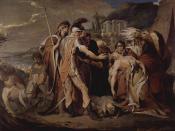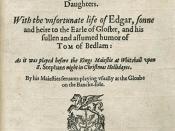A psychoanalytic perspective A feminist reading of King Lear can also explore psychoanalytic issues. In 1.1 Lear commands his daughters to compete in their claims for largesse in exchange for love: Tell me, my daughters"" Since now we will divest us both of rule, Interest of territory, cares of state"" Which of you shall we say doth love us most, That we our largest bounty may extend Where nature doth with merit challenge. (1.1) Specifically challenging Cordelia to out-do her sisters, he asks, 'What can you say to draw / A third more opulent than your sisters? Speak' (1.1). When Cordelia replies, 'Nothing, my lord' (1.1), Lear is outraged. Fixing his will wholly on the compliance from her that he seeks, he demands all or nothing "" if she cannot speak her love better, she will be banished. The father here suggests that he wishes for an exclusive relationship with his favourite daughter: a wish that Cordelia resists in the words, 'Why have my sisters husbands, if they say / They love you all?' (1.1).
Cordelia does not love her father all, and she will not say that she does: she is asking for separation from her father. It is, then, ironically disturbing that in the fifth act, when Lear and Cordelia are reunited and Lear has begged his daughter's forgiveness for his rash action, the old man seizes again on the very exclusivity with her that provoked their initial conflict: Come, let's away to prison.
We two alone will sing like birds i' th' cage.
When thou dost ask me blessing, I'll kneel down And ask of thee forgiveness. So we'll live, And pray, and sing, and tell old tales, and laugh At gilded butterflies, . . . (5.3) It seems that Lear is finally able to gratify his narcissistic fantasy: Upon such sacrifices, my Cordelia, The gods themselves throw incense.
Have I caught thee? He that parts us shall bring a brand from heaven And fire us hence like foxes. (5.3) The words 'Have I caught thee?' (5.3) hint at the alacrity with which he embraces his imprisonment: he is finally to be alone with the daughter who has previously proven perversely elusive.
In this sense, King Lear suggests a triumph of patriarchal fantasies. In her banishment Cordelia has found freedom from her father's constraints, as she herself has acknowledged in 1.1: 'Fare thee well, King. Sith thus thou wilt appear, / Freedom lives hence, and banishment is here' (1.1). In returning from France to her father and accompanying him to prison, Cordelia says, 'For thee, oppressÃÂèd King, I am cast down' (5.3). In these words, she symbolically gives him thevery primacy over the position of any husband which he demanded in 1.1. Does King Lear portray Lear's penitence, as he himself insists? Perhaps it implies instead that his daughter is eventually forced to capitulate to his desire for unity with her.
From an alternative perspective, however, Cordelia's power rests "" as it did in the play's first scene "" in her relationship to words, or rather, in her refusal to use them. When Lear demanded her compliance in 1.1, she replied, 'Nothing, my lord' (1.1); and in this reunion scene when he says, 'Come, let's away to prison' (5.3), it is significant that she does not reply. Cordelia's silence is reminiscent of the final scene in Measure for Measure when the Duke proposes marriage to Isabella and she returns him no reply. While Isabella's silence has by many critics been taken as willing acquiescence in the Duke's proposal, it indeed provides a profoundly ambivalent moment: her silence could just as readily signify her resistance to an unavoidable fate. Just as Isabella retains the last word precisely because she refuses to utter it, so too when Lear bids Cordelia revel in her unity with him, her silence forbids interpretative foreclosure: her mind remains its own place.





